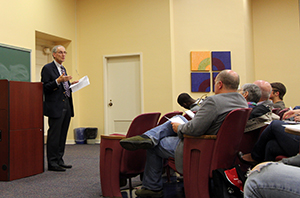In the study of antiquity, slavery is a dark yet unavoidable component. Keith Bradley, Eli J. and Helen Shaheen Professor Emeritus of Classics at the University of Notre Dame, emphasized that at this year’s John F. Charles Lecture. His talk, entitled “Revolt and Rebellion: Resisting Slavery at Rome,” was sponsored by the Departments of Classics and History.
 “Slavery is not a palatable subject,” Bradley said. “We have to face the reality that for all the wonderfulness about Roman antiquity, nonetheless there was this very unpleasant underside to Roman culture. Roman culture was by definition extremely violent and, in some aspects, extremely cruel.”
“Slavery is not a palatable subject,” Bradley said. “We have to face the reality that for all the wonderfulness about Roman antiquity, nonetheless there was this very unpleasant underside to Roman culture. Roman culture was by definition extremely violent and, in some aspects, extremely cruel.”
In his introduction of Bradley, Jeremy Hartnett ’96, Associate Professor of Classics, said Bradley was the highest regarded scholar in his field in the study of Roman slavery. Though Bradley prefaced the gravity of the subject and the atrocities of mistreatment that this population faced, he joked that he had his own “captive” audience to which he delivered his talk.
The John Charles Lecture is sponsored annually by Bruce Baker ’65, a former student of Charles in the study of history and classics. Hartnett opened with some anecdotes and funny stories about Charles, a professor here, Hartnett said, between 1940 and 1979.
Bradley said that from a historical lens the slave population in the Roman Empire consisted of those conquered by the Romans and who were spared from death. In a time when slaves were easily members of the aristocracy in another former government, the fine line between slavery and freedom meant very different lives and living conditions depending on what side someone was on.
“Rome was a status conscious society,” Bradley said. “In antiquity, slavery was an equal opportunity condition.”
That equal opportunity among the population also included a variety of jobs and respective living conditions for slaves. Some slaves were well-educated, some also may have specific training in a particular area, Bradley said. Again, that played into the notion of a status conscious Roman society, in which even slaves could be labeled based on his or her job.
 "If you looked at the slave population at any one moment in Roman time, you would see a huge variety of servile statuses that hinged on the job, the type of function that the slave was actually doing,” he said.
"If you looked at the slave population at any one moment in Roman time, you would see a huge variety of servile statuses that hinged on the job, the type of function that the slave was actually doing,” he said.
A large part of Bradley’s talk centered on the various ways the Roman slave population coped with its condition. Whether it was accommodation of the condition, revolt or rebellion against an individual owner or the system at-large, or escaping from it, Bradley said a variety of second century source documents give evidence that these were often used tactics.
Bradley said that unlike with slavery in the Americas through the 19th century, escape and conformity into society was, although extremely difficult, probable in a slave system where race and ethnicity didn’t define one as slave or free.
“The concept of human rights was simply non-existent in antiquity.”